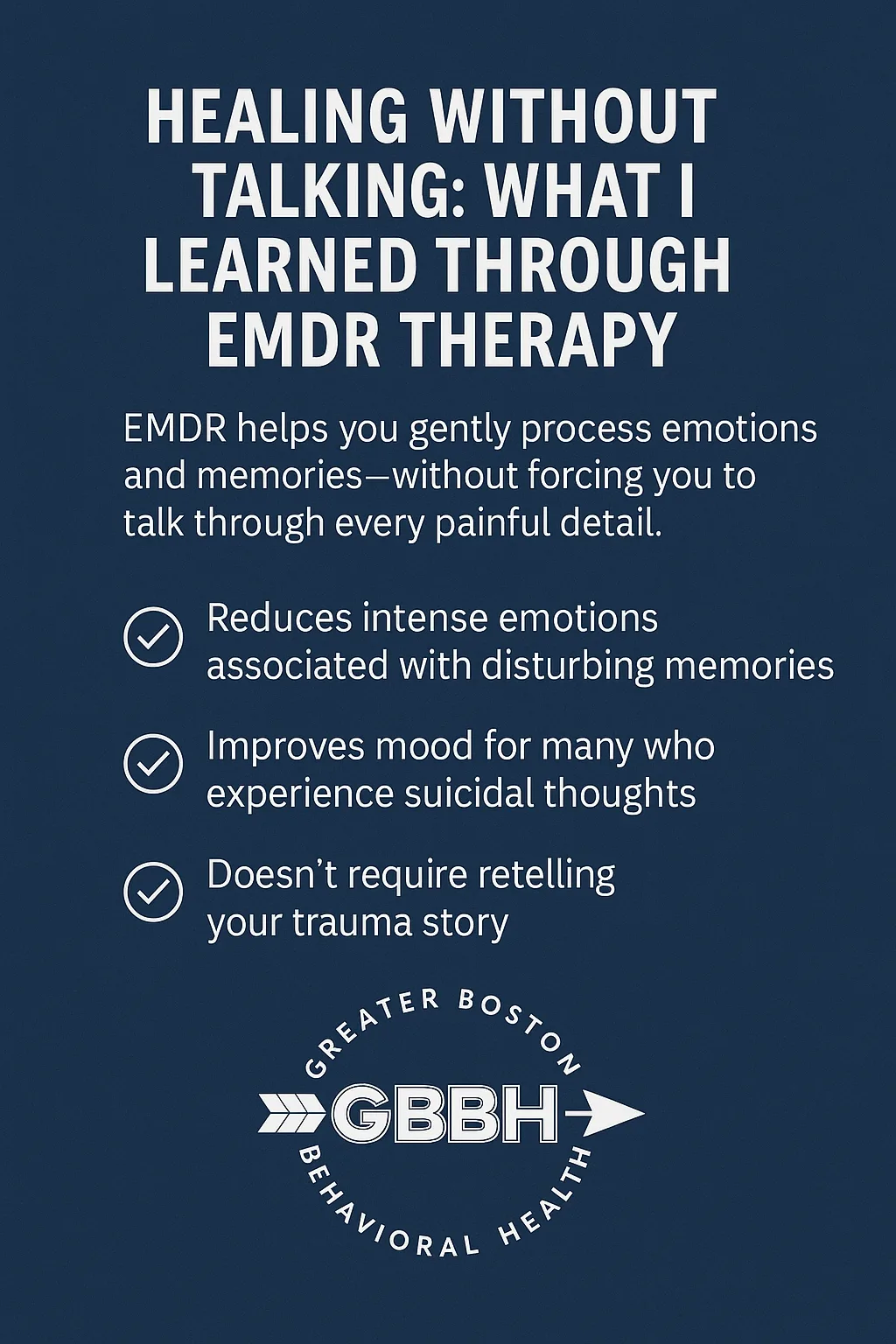Some days, I couldn’t explain it—not to friends, not to therapists, not even to myself. I just knew I was tired. Tired in a way that didn’t go away with rest. Tired of feeling like nothing could touch the heaviness pressing down on me. Suicidal thoughts came and went, but I didn’t really want to die. I just wanted the constant ache to stop.
When I found EMDR therapy, I wasn’t sure what to expect. I only knew that talking hadn’t been enough. It felt like every session, I was explaining my sadness in circles, but I couldn’t feel any different. EMDR offered something I didn’t know I was allowed to hope for: relief without having to talk through it all.
At Greater Boston Behavioral Health, we work with people every day who feel stuck in this quiet pain. You don’t have to find the right words to get better. You don’t have to perform your trauma for someone else to take it seriously. EMDR meets you right where you are—silent, hurting, but still willing to try.
EMDR Therapy: A Different Way to Heal
EMDR stands for Eye Movement Desensitization and Reprocessing. It’s not magic, but for many, it feels like a turning point. This therapy helps your brain gently “unstick” memories and emotional patterns that keep you in cycles of distress—without forcing you to retell or re-experience every painful detail.
For people who live with suicidal ideation but don’t actively want to die, EMDR can be especially powerful. You may not have a specific trauma you can easily name, or you may have many moments that feel too overwhelming to touch. EMDR therapy doesn’t require you to explain everything. It allows your nervous system to settle, offering you a path out of numbness and exhaustion.
In Boston, our EMDR therapy program is tailored to individuals who need a quieter, more internal way to process pain—especially when words feel like too much.
When You Feel Like Giving Up, Small Shifts Matter Most
The first few EMDR sessions were strange, but not in a bad way. I didn’t have to talk through the story of my life. My therapist asked me to notice a feeling, or an image, or even just a tightness in my chest. We followed that—not with words, but with gentle eye movements and short, safe moments of focus.
I didn’t walk out of my first session “cured.” But I did notice something: I didn’t spiral quite as quickly. My anxiety didn’t grip me as hard. I found myself breathing a little deeper without trying. The smallest things—getting out of bed, making food, responding to a text—felt a fraction easier.
And sometimes, when you’ve been living in that heavy, gray space, those fractions are everything. That’s the heart of EMDR therapy. Quiet, gradual, and deeply rooted in the idea that healing doesn’t always have to come through words.
EMDR Therapy Offers Relief Without Storytelling
One of the reasons people shut down in therapy—especially those with suicidal thoughts—is the exhausting pressure to explain. You’re expected to name what’s wrong, describe why it hurts, and relive the worst moments just to be taken seriously.
EMDR breaks that expectation. It respects that some memories are hard to name, some feelings have no words, and some wounds are better processed somatically rather than verbally. The therapy uses a structured approach involving eye movements or gentle tapping while you focus on internal sensations. This helps your brain “digest” unresolved emotions and memories naturally, much like it does during REM sleep.
At Greater Boston Behavioral Health, we make sure EMDR sessions feel safe, steady, and never overwhelming. Whether you’re in Boston or looking for EMDR therapy in West Roxbury, MA, we guide each session based on your readiness—never pushing you beyond what feels manageable.
EMDR Isn’t a Quick Fix, but It’s a Gentle One
You won’t hear us promise instant transformation, because that wouldn’t be fair to you. Healing takes time, especially when life has felt unlivable for so long. But EMDR offers something quieter and more sustainable: small, noticeable shifts that build on each other.
Week after week, many clients report fewer intrusive thoughts, less body tension, more restful sleep, and a greater sense of calm. These aren’t flashy success stories—they’re quiet victories. The kind of change where one morning you realize, I didn’t hate myself when I woke up today.
That’s the power of EMDR therapy. It’s not about forcing happiness. It’s about helping you move away from constant pain and toward something gentler, quieter, and more alive.
You Deserve Care Even If You Don’t Know What to Say
At Greater Boston Behavioral Health, we believe in meeting people exactly where they are. You don’t need to have the words. You don’t need a rehearsed story of why you feel the way you do. You just need a tiny willingness to see if something else could be possible.
Whether you’re close by or looking for EMDR therapy in Needham, MA, our team is here to help you experience healing that honors your silence and your humanity. And for those in Newton, or West Roxbury, we have nearby locations to make care accessible.
Frequently Asked Questions About EMDR Therapy
What is EMDR therapy?
EMDR (Eye Movement Desensitization and Reprocessing) is a therapy that helps people process distressing memories, emotions, and body sensations using bilateral stimulation like eye movements or tapping. It’s particularly helpful for trauma, anxiety, and persistent emotional pain—even when you can’t fully explain why you feel the way you do.
How does EMDR therapy help with suicidal thoughts?
Many people who experience suicidal ideation feel trapped in cycles of overwhelming emotion or numbness. EMDR helps reduce the intensity of these emotions by processing unhealed experiences and calming the nervous system. You won’t be forced to explain every thought—you’ll be guided to process in a way that feels safer and less overwhelming.
Do I have to talk a lot during EMDR?
No. One of the strengths of EMDR is that it doesn’t require you to talk through every detail. You’ll briefly notice feelings, images, or body sensations, but much of the work happens internally. Many people find it less exhausting than traditional talk therapy.
How many EMDR sessions will I need?
This varies from person to person. Some people experience noticeable relief after a few sessions, while others benefit from ongoing EMDR as part of a larger therapy plan. Your therapist will work with you to regularly reassess your progress and goals.
Is EMDR therapy available near me?
If you’re in Boston, Greater Boston Behavioral Health offers a full EMDR therapy program. We also provide services to nearby areas—if you’re looking for EMDR therapy in Newton, MA or other surrounding towns, we’d be honored to help.
Quiet Healing Is Still Real Healing
You don’t have to put on a brave face, tell your whole life story, or find the perfect words to begin healing. EMDR therapy offers a gentle, structured way to move through pain—even the kind you can’t explain.
Call (888) 450-3097 or visit to learn more about our EMDR therapy services in Boston, Massachusetts. You’re allowed to heal quietly—and we’re here to help.


